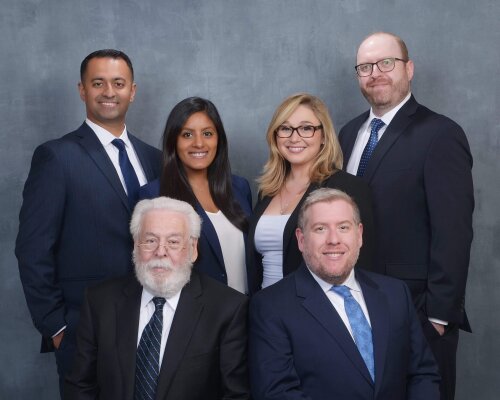Best General Litigation Lawyers in Philadelphia
Share your needs with us, get contacted by law firms.
Free. Takes 2 min.
List of the best lawyers in Philadelphia, United States
About General Litigation Law in Philadelphia, United States
General litigation refers to the process of resolving civil disputes through the courts or through formal dispute-resolution procedures. In Philadelphia, civil litigation covers a wide range of matters including contract disputes, personal injury, property and real estate disputes, landlord-tenant matters, business and commercial claims, consumer protection issues, and probate-related disputes. Litigation in Philadelphia is governed by a mix of local court rules, Pennsylvania state statutes and rules of civil procedure, and federal rules when a case is heard in federal court. The two primary local forums for civil matters are the Philadelphia Municipal Court, which handles lower-dollar and certain summary matters, and the Philadelphia Court of Common Pleas, which handles broader and more complex civil litigation. For federal claims or cases involving federal law or parties from different states, the United States District Court for the Eastern District of Pennsylvania hears cases arising in Philadelphia.
Why You May Need a Lawyer
People choose to hire a lawyer for litigation for many reasons. A lawyer can explain your legal rights and potential remedies, evaluate the strength of your case, and advise whether litigation, settlement, or alternative dispute resolution is best for your situation. Lawyers help prepare and file court papers correctly, meet procedural deadlines, and conduct discovery to gather evidence. They can draft and respond to motions, negotiate settlements, represent you at hearings and trials, and, if necessary, handle appeals. Complex legal and factual issues, high financial stakes, unclear liability, the need for expert witnesses, or the risk of losing important rights due to missed deadlines are common situations in which retaining counsel is highly advisable.
Even in lower-dollar or seemingly straightforward matters, an attorney can often improve settlement value, reduce personal exposure, and navigate rules that nonlawyers may not be familiar with. Conversely, some small claims or simple disputes can be handled pro se - representing yourself - but you should weigh the cost-benefit and potential risks before proceeding without counsel.
Local Laws Overview
Court structure and jurisdiction in Philadelphia - Civil cases are heard in different local courts depending on the claim, amount in controversy, and subject matter. Philadelphia Municipal Court handles certain smaller civil actions and landlord-tenant matters, while the Philadelphia Court of Common Pleas has general jurisdiction over more substantial and complex civil disputes. Federal cases that raise federal questions or involve diversity jurisdiction are heard in the Eastern District of Pennsylvania.
Rules and procedures - Litigation in Philadelphia follows Pennsylvania Rules of Civil Procedure and local rules adopted by each court. These rules set deadlines for filing, service requirements, limits on pleadings, discovery procedures, motion practice, and trial procedures. Local rules may include specific procedures for case scheduling, pretrial conferences, and electronic filing.
Statutes of limitations and timing - Each type of claim has a statutory deadline within which you must file a lawsuit. Common examples include shorter limitations for personal injury claims and longer periods for many contract-based claims. Missing a statute-of-limitations deadline can bar a claim, so it is important to confirm applicable time limits early.
Alternative dispute resolution - Courts and local rules encourage - and sometimes require - mediation or other forms of alternative dispute resolution before trial. ADR can be faster and less expensive than litigation and is commonly used in commercial, family, and employment disputes.
Enforcement and remedies - If you win a judgment, Pennsylvania law provides mechanisms to collect it, such as wage garnishment, bank levies, liens on real property, and motions to execute on assets. Certain types of judgments may also be subject to specific enforcement procedures under state law.
Frequently Asked Questions
What counts as general civil litigation?
General civil litigation includes legal disputes between private parties or businesses where one party seeks compensation, performance, or another judicial remedy. Common categories are contract disputes, negligence and personal injury, property disputes, landlord-tenant conflicts, business and commercial litigation, consumer protection claims, and probate litigation. Civil litigation does not include criminal prosecutions.
How do I know if I should sue or try to settle?
Deciding whether to sue or settle depends on the strength of your case, the cost of litigation, the timeframe, the likelihood of collecting a judgment, and your personal goals. A lawyer can help evaluate the legal merits and the probable costs and outcomes of litigation versus settlement. Early negotiation and demand letters often resolve matters without filing a lawsuit.
How long do civil cases typically take in Philadelphia?
Duration varies widely. Simple small claims or summary matters can resolve in a matter of weeks to months. Complex cases that require extensive discovery, multiple motions, expert testimony, or a full trial can take many months to several years. Appeals add additional months or years. Planning around statutory deadlines, scheduling, and court availability is important.
What are common fee arrangements with litigation attorneys?
Fee arrangements include hourly billing, contingency fees, flat fees for discrete tasks, and blended arrangements. Personal injury and certain consumer cases often use contingency fees - the lawyer is paid a percentage of the recovery. Hourly billing or retainers are common in commercial litigation. Clients should obtain a written fee agreement that explains costs, retainers, billing practices, and how out-of-pocket expenses are handled.
What courts in Philadelphia will hear my case?
Which court hears your case depends on the subject matter and amount in controversy. Municipal Court hears many lower-dollar and summary civil matters and landlord-tenant cases. The Court of Common Pleas handles a wide range of civil litigation and more substantial matters. Federal court - the Eastern District of Pennsylvania - hears federal question cases and some diversity jurisdiction cases. A local attorney can identify the correct forum for your claim.
What happens if the defendant does not respond after I file a complaint?
If a defendant does not respond to a properly served complaint within the time allowed by the rules, the plaintiff can seek a default judgment. Courts will typically require proof of service and may require an affidavit of damages or a hearing before entering judgment. Even after a default judgment, the plaintiff may need to take additional steps to enforce collection.
What is discovery and why is it important?
Discovery is the formal process of exchanging information and evidence before trial. It includes written questions (interrogatories), document requests, requests for admissions, depositions under oath, and subpoenas for third-party records. Discovery is critical because it allows each side to learn the other side's evidence and prepare for trial or settlement.
Are there options besides going to trial?
Yes. Alternative dispute resolution options include mediation, which uses a neutral facilitator to help parties reach a settlement, and arbitration, where a neutral arbitrator decides the dispute. ADR can be voluntary, court-ordered, or contractually required. Settlement negotiations can occur at any stage of litigation and are often the most efficient way to resolve disputes.
How do statutes of limitations affect my case?
Statutes of limitations set the deadline for filing a lawsuit. Different types of claims have different limitation periods. If you miss the deadline, the defendant can move to dismiss your claim as time-barred. Because these deadlines can vary and exceptions may apply, it is important to check applicable statutes early and consult an attorney promptly.
How do I collect a judgment if I win?
Winning a judgment is only part of the process - collecting it may require additional legal steps. Common enforcement tools include wage garnishment, bank account levy, liens on real property, and writs of execution to seize nonexempt property. A judgment may also be docketed to create a lien on real estate. Enforcement can be complex and may require specialized collection actions or negotiation for a payment plan.
Additional Resources
Philadelphia Court of Common Pleas - the local trial court that handles major civil cases and provides local court rules and procedural information.
Philadelphia Municipal Court - handles many landlord-tenant matters and lower-dollar civil actions and provides forms and guidance for those litigants.
Pennsylvania Rules of Civil Procedure and local court rules - these govern pleadings, service, discovery, motion practice, and trial procedures for state court litigation.
United States District Court for the Eastern District of Pennsylvania - for federal civil cases arising in Philadelphia.
Philadelphia Bar Association and Pennsylvania Bar Association - offer lawyer referral services, ethics guidance, and public information on hiring counsel and fee arrangements.
Legal aid organizations - including community legal services and pro bono providers in Philadelphia - can help low-income litigants with civil matters, landlord-tenant issues, and consumer or benefits disputes.
Court self-help centers and clerk offices - provide information on filing procedures, forms, court calendars, and basic guidance about the litigation process. Many courts also provide information about mediation and self-representation resources.
Next Steps
If you believe you have a civil dispute that may require litigation, take these steps to protect your interests. First, preserve and organize all relevant documents - contracts, emails, photographs, invoices, medical records, receipts, and any written communications. Keep a clear timeline of events and a list of potential witnesses. Second, calendar any deadlines you know about and check potential statutes of limitations - do not wait until a deadline has passed to seek help. Third, consider an initial consultation with an experienced local litigation attorney to evaluate your case, discuss likely outcomes, and learn about fee structures. Fourth, explore alternative dispute resolution - mediation or arbitration - if you want to pursue a faster or less costly resolution. Fifth, if you cannot afford private counsel, contact legal aid or pro bono providers to learn about eligibility for assistance.
Remember that this guide is informational only and does not constitute legal advice. Laws and court procedures change, and each case is unique. For advice specific to your situation, consult a qualified attorney licensed to practice in Pennsylvania and familiar with Philadelphia courts.
Lawzana helps you find the best lawyers and law firms in Philadelphia through a curated and pre-screened list of qualified legal professionals. Our platform offers rankings and detailed profiles of attorneys and law firms, allowing you to compare based on practice areas, including General Litigation, experience, and client feedback.
Each profile includes a description of the firm's areas of practice, client reviews, team members and partners, year of establishment, spoken languages, office locations, contact information, social media presence, and any published articles or resources. Most firms on our platform speak English and are experienced in both local and international legal matters.
Get a quote from top-rated law firms in Philadelphia, United States — quickly, securely, and without unnecessary hassle.
Disclaimer:
The information provided on this page is for general informational purposes only and does not constitute legal advice. While we strive to ensure the accuracy and relevance of the content, legal information may change over time, and interpretations of the law can vary. You should always consult with a qualified legal professional for advice specific to your situation.
We disclaim all liability for actions taken or not taken based on the content of this page. If you believe any information is incorrect or outdated, please contact us, and we will review and update it where appropriate.










